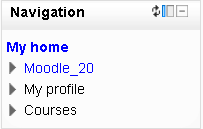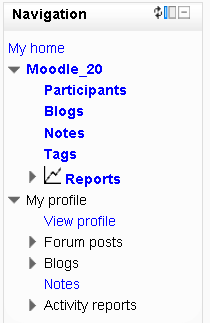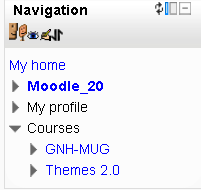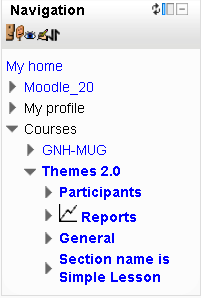Navigation block: Difference between revisions
- Managing blocks
- Block settings
- Activities
- Admin bookmarks
- Blog menu
- Blog tags
- Calendar
- Comments
- Community finder
- Course completion status
- Course overview
- Course/site description
- Courses
- Flickr
- HTML
- Latest news
- Login
- Logged in user
- Main menu
- Mentees
- Messages
- My private files
- Navigation
- Network servers
- Online users
- People
- Quiz results
- Random glossary entry
- Recent activity
- Remote RSS feeds
- Search forums
- Section links
- Self completion
- Settings
- Social activities
- Tags
- Upcoming events
- Youtube
- Blocks FAQ
Mira Vogel (talk | contribs) |
Helen Foster (talk | contribs) (blocks template) |
||
| (12 intermediate revisions by 2 users not shown) | |||
| Line 1: | Line 1: | ||
{{ | {{Blocks}} | ||
The Navigation Block is a feature of Moodle 2.0, and contains an expanding tree menu. Default menu items include My Home, Site Pages, My Profile, and Courses. | The Navigation Block is a feature of Moodle 2.0, and contains an expanding tree menu. Default menu items include My Home, Site Pages, My Profile, and Courses. | ||
| Line 15: | Line 14: | ||
|} | |} | ||
== | ==Navigation Block settings== | ||
Site Administrators can configure the site level Navigation Block. Teacher and Student roles have limited options to configure the position of the Navigation Block on their MyMoodle page. | |||
Log in, go to the course area, Turn Editing On, then select the Edit icon in the Navigation Block. Then configure the following settings. | Log in, go to the course area, Turn Editing On, then select the Edit icon in the Navigation Block. Then configure the following settings. | ||
===Allow users to dock this block=== | ===Allow users to dock this block=== | ||
This allows | This allows users to free up screen area if they need to, displaying a link to the Navigation Block in a tab at the side. | ||
===Display categories as links=== | ===Display categories as links=== | ||
| Line 30: | Line 29: | ||
===Trimming=== | ===Trimming=== | ||
Long titles | Long titles wrap over several lines, and this can affect the readability of a menu. | ||
Enabling trimming removes characters which exceed | Enabling trimming removes characters which exceed an optional limit for each menu item. There is an option to remove characters from the beginning, middle, or end of the title. | ||
===Generate Navigation for the following=== | ===Generate Navigation for the following=== | ||
| Line 38: | Line 37: | ||
The options in this setting allow you to configure how far the menu should expand. | The options in this setting allow you to configure how far the menu should expand. | ||
;Everything: the menu expands to allow access to any page in any of your course areas. | |||
;Categories and courses: the menu expands as far as listing links to the course areas in each category. | |||
;Categories, courses and course structures: the menu expands as far as listing the section titles in each course area (these display unlinked). | |||
;Categories, courses and course activities: the menu expands to allow access to any page in any of your course areas. | |||
===Page contexts=== | ===Page contexts=== | ||
;Display on front page only: the menu will be visible only on the front page | |||
;Display on the front page and any pages added to the front page: the menu will be visible on the front page and pages added to it, but not on individual course area pages (for each course area there's the option to enable a separate, configurable Navigation Block). | |||
;Display throughout the entire site: the menu will be visible on every page of the site (n.b. there's the potential for confusing duplication if a Navigation Block is enabled for a course area). | |||
===[And the rest of the settings TBC]=== | ===[And the rest of the settings TBC]=== | ||
==To hide the Navigation Block== | |||
Administrators can hide the Navigation Block at course level via Site Administration > Plugins > Blocks. This is site wide, therefore drastic, and should only be pursued after consultation. | |||
At course area level, Teachers can hide their Navigation Block by clicking its Pen/Hand icon to access its Settings, clicking Permissions, and removing from Authenticated User the View Block capability. | |||
==See also== | ==See also== | ||
[ | *Using Moodle [http://moodle.org/mod/forum/discuss.php?d=115620 What is the structure of a Moodle site?] forum discussion | ||
[[Category:Block]] | |||
[[eu:Nabigazioa_blokea]] | [[eu:Nabigazioa_blokea]] | ||
Latest revision as of 07:53, 1 October 2011
The Navigation Block is a feature of Moodle 2.0, and contains an expanding tree menu. Default menu items include My Home, Site Pages, My Profile, and Courses.
The block's appearance and location can be Theme dependent. This block can also appear in a course. The navigation block contents depends upon the global settings, context, and the role of the user.
Overview
The navigation block has links which can be expanded or collapsed. Here are examples of a 2.0 Standard theme's navigation block in collapsed mode and one that has the higher links opened one level.
Site Administrators can configure the site level Navigation Block. Teacher and Student roles have limited options to configure the position of the Navigation Block on their MyMoodle page.
Log in, go to the course area, Turn Editing On, then select the Edit icon in the Navigation Block. Then configure the following settings.
Allow users to dock this block
This allows users to free up screen area if they need to, displaying a link to the Navigation Block in a tab at the side.
Display categories as links
As long as Display Categories is enabled in Site Administration > Appearance > Navigation (which it is by default), this setting can be enabled.
Where Categories display as links, clicking on those links opens the category page, whereas clicking on the small arrowhead pulls down a further menu of its courses. It may be helpful to induct users to this distinction.
Trimming
Long titles wrap over several lines, and this can affect the readability of a menu.
Enabling trimming removes characters which exceed an optional limit for each menu item. There is an option to remove characters from the beginning, middle, or end of the title.
The options in this setting allow you to configure how far the menu should expand.
- Everything
- the menu expands to allow access to any page in any of your course areas.
- Categories and courses
- the menu expands as far as listing links to the course areas in each category.
- Categories, courses and course structures
- the menu expands as far as listing the section titles in each course area (these display unlinked).
- Categories, courses and course activities
- the menu expands to allow access to any page in any of your course areas.
Page contexts
- Display on front page only
- the menu will be visible only on the front page
- Display on the front page and any pages added to the front page
- the menu will be visible on the front page and pages added to it, but not on individual course area pages (for each course area there's the option to enable a separate, configurable Navigation Block).
- Display throughout the entire site
- the menu will be visible on every page of the site (n.b. there's the potential for confusing duplication if a Navigation Block is enabled for a course area).
[And the rest of the settings TBC]
Administrators can hide the Navigation Block at course level via Site Administration > Plugins > Blocks. This is site wide, therefore drastic, and should only be pursued after consultation.
At course area level, Teachers can hide their Navigation Block by clicking its Pen/Hand icon to access its Settings, clicking Permissions, and removing from Authenticated User the View Block capability.
See also
- Using Moodle What is the structure of a Moodle site? forum discussion



